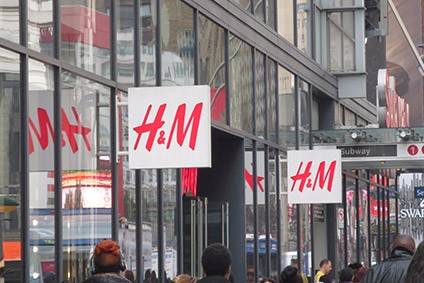
H&M has hit back at campaigners alleging the brand is falling short of its responsibility to protect workers in its supply chain through compensation, despite the retailer announcing last week almost 1m workers are benefiting via its fair wage strategy.
Clean Clothes Network launched an attack on H&M today (24 September) in which it said many of the brand’s apparel makers are living below the poverty line.
It claims workers in India earn a third of the estimated living wage, while workers in Cambodia earn less than half.
Workers at H&M’s “gold supplier” in Bulgaria, it alleges, “are not even earning 10% of what would be required for families to have decent lives” forcing them to work overtime to cover basic needs.
It also points out factory faintings were a “daily occurrence” in Bulgaria.
The campaign group calls for “transparent changes in the real wages of workers in H&M’s supply chain – a roadmap with time-bound, measurable wage level increase targets, detailing how H&M will change their purchasing practices to make sure workers get a living wage.”

US Tariffs are shifting - will you react or anticipate?
Don’t let policy changes catch you off guard. Stay proactive with real-time data and expert analysis.
By GlobalDataSpeaking to just-style today, a spokesperson for H&M said while the group supported the campaigner’s vision of “systemic change in the textile industry” and that textile workers should earn a living wage, it “did not share their view of the textile industry and how best to achieve progress”.
“Firstly; there is no universally agreed level for living wages, and secondly; wage levels should be defined and set by the parties on the labour market through fair negotiations between employers and workers representatives, not by Western brands,” said the spokesperson. “This is something we, industry experts, the UN-body ILO and trade unions agree upon.
“Our efforts over the past five years, together with other brands, trade unions, the ILO, and other partners, have been to create the necessary foundation for an improved wage setting mechanism; to strengthen workers voice, and to enable negotiation at the factory as well as at industry level. Through the groundbreaking collaboration ACT, we aim towards industry-wide collective bargaining systems supported by brands committing to responsible purchasing practices. This is a way to create a level playing field and improvements for all garment workers, regardless of the factory they work in, and the brands they produce for,” the spokesperson continued.
“We are proud of and fully committed to our work within this area. We reach more than 600 factories and 930,000 garment workers with our fair living wage strategy launched in 2013, meaning we have exceeded our very first milestone. Our collaboration with other industry experts in combination with our long experience from working on the ground in garment producing countries, gives us invaluable knowledge and makes us confident that we are on the right track.
“All suppliers we work with must sign our Sustainability Commitment. We require that suppliers pay their employees at least the minimum wage; that overtime hours are within legal limits and correctly compensated; and that they follow national law. We regularly follow up on our requirements and if we find any violations we take action. If the supplier does not make necessary improvements, we ultimately end the business relationship. The claims in the report that a number of supplier factories producing for H&M group do not pay minimum wages have not been confirmed by our comprehensive audits and assessment programs ensuring factories live up to our minimum requirements,” the spokesperson added.



